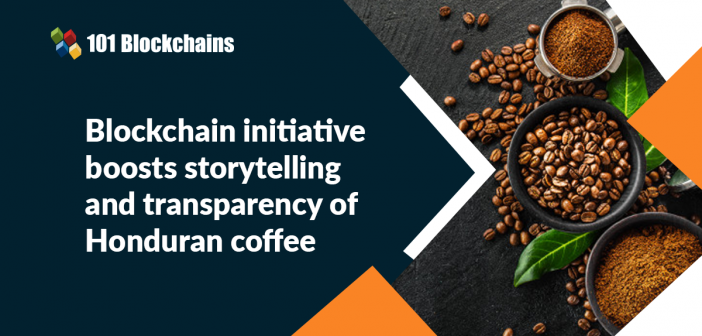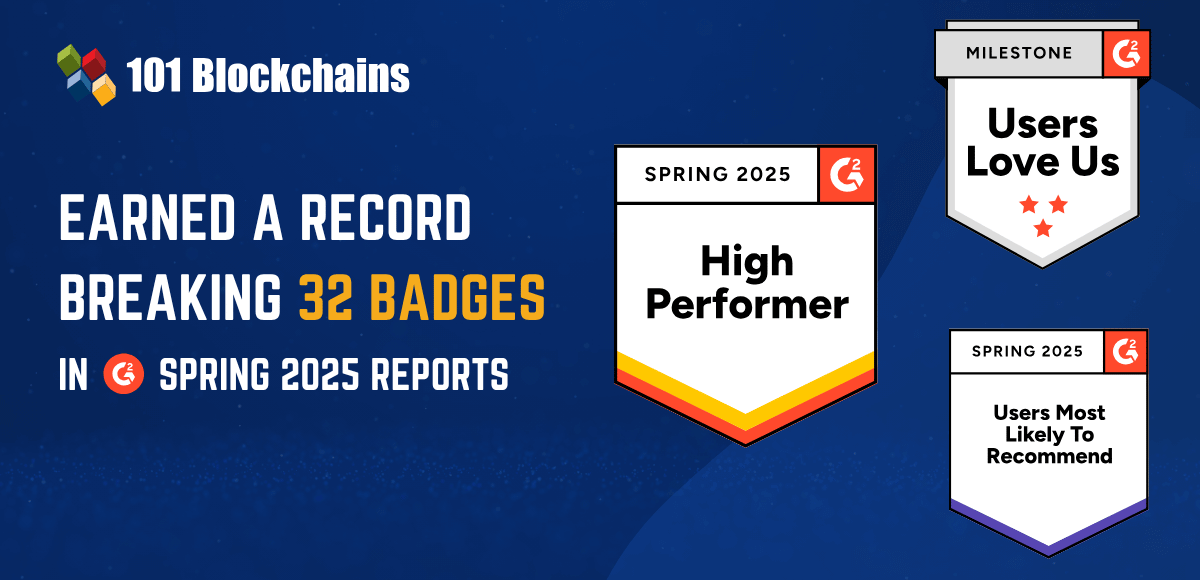Learn how blockchain truly works, master key definitions, and uncover what makes smart contracts so "smart." Dive into the fundamentals, gain valuable insights, and start your blockchain journey today!

- News & Updates
101 Blockchains
- on April 15, 2021
Blockchain Initiative Uplifts Storytelling and Transparency of Honduran Coffee
Massimo Zanetti Beverage Group has achieved a unique feat by bringing in the “first blockchain coffee” from Honduras. The new ‘farm-to-cup’ beverage introduced by the Massimo Zanetti Beverage Group is traceable. Now, consumers could find a QR code on the packs of “Segafredo Storia” for discovering the type of coffee in the pack, the place of cultivation, and identity of the farmers.
The new ‘farm-to-cup’ traceable beverage introduces new norms for transparency into the supply chain for coffee production. Massimo Zanetti Beverage Group has leveraged the software capabilities of Farmer Connect with the power of IBM Blockchain for the new system. Now, the new beverage traceability system can show the journey of the coffee in terms of a map created on the basis of encrypted blockchain data. The origins of the map begin from the coffee farming region, and it covers shipment and all other processes. The final stages of the map showcase the site of roasting and packing the product in Finland.
Enroll Now: Enterprise Blockchains and Supply Chain Management Course
Launch of Farm-to-cup Beverage
The ‘farm-to-cup’ beverage will be launched throughout 11 main markets in Europe in April. Furthermore, the company has also planned launches in global markets at the beginning of next year in 2022. Interestingly, the Massimo Zanetti Beverage Group has also planned the introduction of a few other coffee origins for next year.
According to the founder and chairman of Massimo Zanetti Beverage Group Massimo Zanetti, “We are aware of the influence of our international presence and how it is important for us to foster a culture of transparency and sustainability.” He also added, “We are committed to safeguarding human rights, driving sustainable development across the value chain, and restrict our impact on the environment.”
The European Investment Bank, an international financial institution owned by European Union member states, is reportedly exploring blockchain technology for issuing digital bonds.
With ‘Transparency Triumphs’ gaining top position among top trends of 2021 in the Innova Market Insights, the immutability property of blockchain has gained profound attention. The immutability of blockchain helps companies ensure consistent quality monitoring, eco-aware practices, and fair remunerations throughout their supply chains.
Also Read: Carrefour Expands Blockchain Technology To Textiles
Origin and the Path of Coffee
The new Segafredo Storia coffee features an illustration of the coffee’s story from its origins to the customer’s hands. The coffee package showcases photos of the actual people who had participated in production of Storia coffee. Furthermore, consumers could also find additional information about sustainability projects and initiatives carried out in Honduras on the package. Massimo Zanetti Beverage Group has selected around 51 farmers from the regions of Intibucá and Lempira in Honduras for participation in the new product series.
The Massimo Zanetti Beverage Group has served as an active local sponsor for bringing farmers on board with quality and sustainability initiatives in Honduras. Such types of initiatives have the capability of supporting better productivity and earnings for farmers. In addition, the company’s social initiatives can help in improving the education and wellbeing of children of the farmers.
Massimo Zanetti stated that their company has always focused on integrating the supply chain and participants in the supply chain. The participants in the supply chain include the farmers worldwide and the people working in stores and café. Furthermore, Zanetti also emphasizes the importance of commitment to safeguarding business ethics, the environment, and human rights.
Organic Quality and Rainforest-Suitable
The Segafredo Storia coffee provides formidable assurance of 100% organic quality. In addition, it also has the certification by Rainforest Alliance, thereby indicating how it is suitable for rainforests. Consumers could avail the Segafredo Storia coffee in espresso and filter coffee variants, either in whole bean or ground form. The coffee will also be available for retail and food service stores. The attractive highlight of Segafredo Storia is that it is a single-origin coffee. Manufactured from completely high-grown Arabica coffee, Segafredo Storia claims the assurance of authentic coffee for its consumers.
The coffee blend features three distinct types of Arabica varieties, including Lempira, Catuai, and Typica. The three varieties are subject to blending and roasting according to the two popular premium quality cup profiles. The premium quality cup profiles of Segafredo Storia are ideal for filter coffee and espresso.
The filter coffee variant comes with a medium roast alongside sweet notes and a hint of dark chocolate. On the other hand, the espresso coffee features a subtly darker roast and a pleasant acidity with fruity notes.
Premium coffee certified Organic and Rainforest Alliance, Segafredo Storia will be available in espresso and filter versions, in beans and ground, both for the catering world and for retail distribution.
Beverage Traceability
Innova Market Insights considered storytelling as one of the top trends for food and beverage product development last year. The ‘Storytelling: Winning with Words’ trend continues to hold dominance even this year. As a matter of fact, storytelling has maintained a profound impact on purchase decisions in recent times. Therefore, companies all over the world are turning their attention towards storytelling throughout all their branding strategies.
IBM and Farmer Connect have made profound improvements in this sector by properly harnessing the power of blockchain. The collaboration has recently launched a new mobile app, known as ‘Thank My Farmer’, which is based on blockchain. The mobile app aims at improving traceability, transparency, and efficiency throughout the coffee supply chain worldwide.
IBM had collaborated with Nestle and French supermarket giant Carrefour last year to enable customers to obtain information from the first blockchain for a national brand in Europe. Carrefour is also considering initiatives for extending the use of blockchain for tracing its textile products.
Along the same lines, Olam Food Ingredients is also using a blockchain-based ‘AtSource’ platform for ensuring sustainable cultivation of ingredients. The AtSource platform focuses on ingredients for the company’s Ghana single-origin cocoa powder, deZaan D11MG, and its antioxidant-enriched cascara or coffee cherry iced tea.
Also Read: New York State Testing IBM Covid-19 Blockchain App
What’s Beyond the Lines
IBM has also helped another coffee company, the JM Smucker Company, for leveraging blockchain technology to foster coffee transparency. Last year, Smucker’s coffee engaged in collaboration with Farmer Connect, which leverages IBM Blockchain for offering better traceability.
While Smucker’s coffee is 100% Colombian bagged, the entry of Massimo Zanetti in the blockchain space could take the story of Honduran coffee to the world. Customers do like a good story about the product in their hands, especially when it’s backed by facts and imagery. Most important of all, storytelling can serve as the next big thing in driving the adoption of new technologies.
The French car manufacturer Hopium continues to imagine the future of mobility by integrating blockchain technology at the source of the development of its hydrogen vehicle, a first in the automotive industry.




